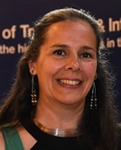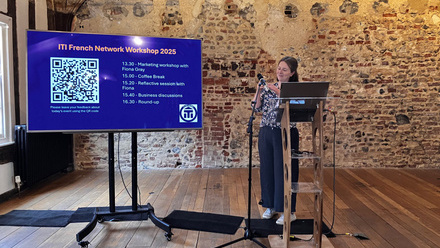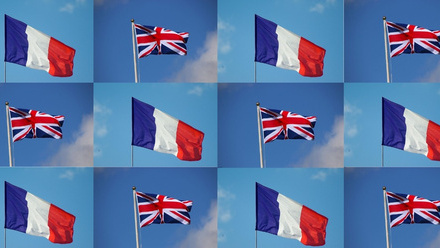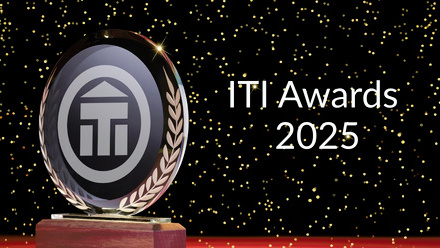A rich tapestry of translation - ITI Award winners
The ITI Awards recognise and celebrate a wide range of translation achievements, as illustrated by our winners in the translation assignment category over the last five years.
The Best Performance on an Assignment - Translation category has been at the heart of our awards programme since this was expanded in 2016. We are now inviting entries for the 2023 awards, which are open to both individual and team entries in this category.
In making decisions about our award winners, no particular type of assignment or sector work is valued above any other – it just depends on the achievements of the individual or team concerned in getting the job done to a high standard.
This is illustrated by our winners and the nature of their assignments over the last five years.
2022 Team winners: Aleksandra Chlon, Alicja Tokarska and Magdalena Herok-Broughton

Aleksandra, Magdalena and Alicja have been recognised for the translation of the Essential Scots-Polish Dictionary, the first dictionary app in this language pair. It was a complex project and is a prime example of translation bridging cultures: the app is designed to help Polish migrants in Scotland feel more at home and part of the local community.
What made you decide to enter the project for the ITI awards?
"We all agree that translating the Essential Scots-Polish Dictionary, the first dictionary app in this language pair, was one of the most memorable and meaningful projects in our careers so far. Not only did we feel that we could genuinely help Polish migrants in Scotland feel part of the local community, we also overcame a great deal of challenges. The most notable difficulties include retaining consistency across almost ten thousand Scots terms and phrases and their Polish translations, dealing with obscure cultural and historical references, ensuring a quick turnaround, working with a huge amount of material often with no context, taking into consideration the many possible meanings of given Scots words, and creating a comprehensive pronunciation guide. We were proud of what we had achieved, and we wanted to share it with the world. We felt that the project deserved the recognition that comes with an ITI Award."
2021 Joint winner: Emma Mandley

Emma was recognised for her translation from Italian into English of the text of The Wyvern Collection: Byzantine and Sasanian Silver, Enamels and Works of Art by Marco Aimone. This was a complex translation of around 156,000 words, requiring great precision in terminolgoy and cross-referencing.
How did it feel to win the award?
This was the first award I’d won for anything for many, many years, so it felt really special. Telling the author of the book and the publishers about it gave me a real buzz: it meant a lot to them too, to know that the work I’d done for them had got this seal of approval, so I felt that I’d given them something that went beyond the translation itself. In the long term, the award has had a subtle impact on me that I didn’t expect at all. After six years as a translator, it immediately – and it seems permanently – cured my impostor syndrome: it feels as though my professional status has somehow been legitimised by the award and I have more confidence in terms of negotiating rates, for example.
Finally, an important continuing benefit has been being able to use the award winner logo on my CV and emails: I’m sure it must have a positive effect on clients’ perceptions – and it gives me a little thrill every time I add it!
2021 Joint winner: Kim Sanderson

Kim was recognised for her translation of Le Corbusier's Practical Aesthetic of the City: The treatise 'La Construction des villes' of 1910/11. This was also a complex translation project of 195,000 words, requiring translation from both French and German, cross-referencing the two and sourcing quotations. It involved considerable resarch, and fine judgement in dealing with questions of tone and style, as well as issues arising from source-language interference where German material had presviously been translated into French.
What made you decide to enter the ITI awards?
'I entered the awards when a colleague mentioned applying. When I thought about it, the book I'd translated was something out of the ordinary and I realised this was the sort of project that would be eligible for an award!'
2020 winner: Agata McCrindle

Agata was instructed as an expert under court order to provide translation of disclosure documents in legal proceedings. The disclosure consisted of several thousand emails and various documents, which Agata translated in batches. The assignment required excellent organisational and liaison skills and the ability to deal with a variety of challenges; for example, accurately translating often technical content from one of the defendants who was dyslexic.
How was your experience of winning the award?
Winning the award has raised my profile, both in the business and translation community. It has given me and my business the boost of confidence. I also learned from the experience and realised that in order to succeed you need a skillset that goes beyond being good at translation - you need to be able to work with your clients by offering them solutions and alternatives, to show respect and understanding of your clients’ needs. Creativity, adaptability and consistency in your approach to translation are key. The assignment I was recognised for has required all those skills and since winning the award I have made sure I approach all my assignments in the same way. You win once and you will always be the winner.
2019 winner: Nathalie Clergues

Nathalie Clergues undertook the French transcreation of a radio advertising campaign. The text referenced nursery rhymes and board games – both bastions of childhood culture. Knowing the historical, musical and lyrical factors to be taken into account to achieve authentic and effective transcreation, and combining these with the needs of the client, were no mean feat.
How was your experience of winning the award?
I was absolutely delighted to win the award. Despite the admirable work professional bodies put into helping raise awareness of translators’ work (and helping raise our own self-esteem in the process!), most translators and our work still go unnoticed. It’s also nice to see transcreation in the spotlight as a specialism, because it’s so seldom recognised. The award is a nice reminder that all the effort, dedication and chocolate mousse that I put into my work are not in vain!
2018 winner: Heather Stacey

The translation assignment was for a major international exhibition commemorating Martin Luther; it not only required intellectual and linguistic rigour and accuracy, but also logistical planning and deadline management of a high standard. The translations produced by a small international team contributed significantly to the accessibility of this important event for native and non-native English speakers.
What made you decide to enter for ITI Awards?
The translation assignment for which I submitted an entry was a very large project and, in many ways, quite career-defining. It was certainly the most intellectually and linguistically challenging project I’d been involved with during nearly 20 years as a translator. When the 2018 awards were announced, I didn’t immediately think of entering, but the idea grew on me. As a freelance translator, I receive very little feedback about my work, unlike friends who work in conventional jobs, with managerial hierarchies. In fact, my clients are often simply not in a position to judge whether or not I have produced a good translation, otherwise they wouldn’t have needed my services in the first place! The only real feedback I get is being paid and being asked to work for the same client again. However, in the case of clients who only speak one of the languages I’m translating between, being paid and receiving repeat work probably says as much about my communication and time management skills as it does about my abilities as a translator.
On the Luther project (the assignment for which I won the award) I worked with an excellent editor who was also a translator and I really valued her feedback on my work. The more I thought about the ITI Awards the more I realised this could be an opportunity to test my work and see how it would be judged by my peers, other translators who would really understand whether or not I was producing work of a high standard.
How was your experience of winning the award?
When I submitted my entry for the award, it really wasn’t with any expectation of winning! It was very exciting to discover that I had won the Best Performance on an Assignment - Translation Award and I enjoyed going to London to collect it. However, I perhaps couldn’t have anticipated that the experience would have such a profound effect on me. I think translators are so often virtually invisible and it is rare to receive this kind of recognition. I felt it immediately gave me a new confidence and authority in my work. I shared the news of my award with all my clients who responded with very kind comments, as did many colleagues. I have also highlighted it to new clients and in competitive tendering processes. I think it has probably already led to me winning at least two new clients – an additional bonus!
Since winning the award I feel I communicate with existing and potential clients with a greater sense of authority. It has been an important part of the process of maturing as a translator and recognising that, even after 20 years as a translator, my work continues to evolve. I feel very grateful to ITI for giving me this opportunity to grow and develop further.
The ITI Awards 2022 have now closed for entries and the winners will be announced at an online ceremony in the summer.
Look out for the launch of the 2023 Awards in the autumn.






